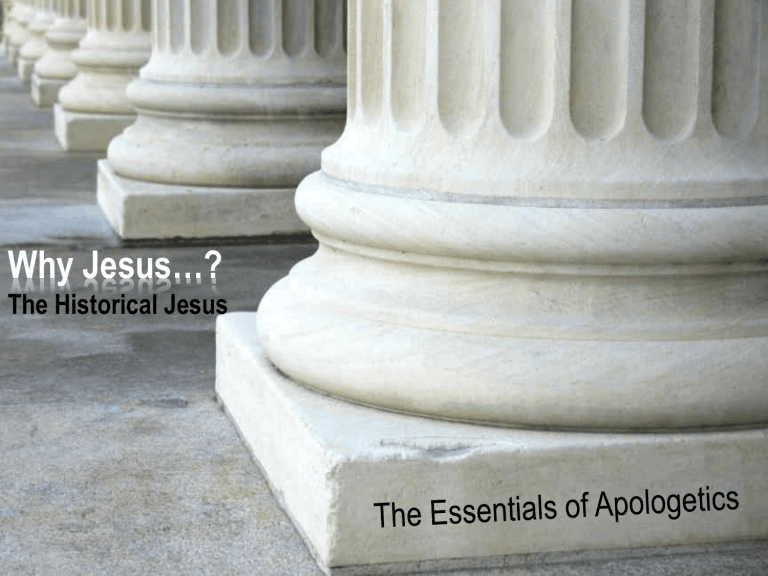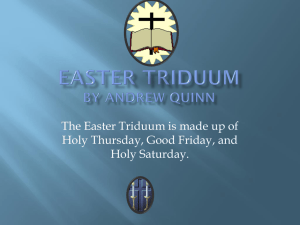Get the Powerpoint presentation

H o p e
Why Jesus…?
Hurting
A Study in 1 Peter
www.confidentchristians.org
Introduction
How do skeptics view the life of Jesus?
The Essentials of Apologetics – Why Jesus: The Historical Jesus
“Historically it is quite doubtful whether Christ ever existed at all, and if he did we know nothing about him.”
– Bertrand Russell
The Essentials of Apologetics – Why Jesus: The Historical Jesus
“Nobody knows who the four evangelists were, but they almost certainly never met
Jesus personally. Much of what they wrote was in no sense an honest attempt at history but was simply rehashed from the Old Testament, because the gospelmakers were devoutly convinced that the life of Jesus must fulfill Old Testament prophecies. It is even possible to mount a serious, though not widely supported, historical case that Jesus never lived at all, as has been done by, among others,
Professor G. A. Wells of the University of
London in a number of books, including
Did Jesus Exist?”
– Richard Dawkins
The Essentials of Apologetics – Why Jesus: The Historical Jesus
“The reality is, Jesus was the Solar Deity of the Gnostic Christian sect and like all other Pagan gods, he was a mythical figure. It was the political establishment that sought to historize the Jesus figure for social control.”
- Peter Joseph (real name, James Coyman), Zeitgeist Movie
The Essentials of Apologetics – Why Jesus: The Historical Jesus
Are the Skeptics Right?
• Was there no actual Jesus of
Nazareth that really lived?
• Was Jesus just an invention, something that was pieced together from ancient pagan god myths?
• Is there no historical evidence to validate the claims that Jesus actually existed?
The Essentials of Apologetics – Why Jesus: The Historical Jesus
A Mythological Jesus?
Is Jesus just a copy of other pagan gods?
The Essentials of Apologetics – Why Jesus: The Historical Jesus
“There is nothing the Jesus of the Gospels either said or did . . . that cannot be shown to have originated thousands of years before, in Egyptian Mystery rites and other sacred liturgies.”
– Tom Harpur
The Essentials of Apologetics – Why Jesus: The Historical Jesus
Where Did the Idea of Jesus Being a Myth Originate?
• Bruno Bauer (1809 – 1882) was a
German theologian, philosopher and historian who looked at the sources of the
New Testament and controversially concluded that early Christianity owed more to Greek philosophy (Stoicism) than to Judaism.
• In 1840, Bauer began a series of controversial works arguing that Jesus was a myth, a second century fusion of
Jewish, Greek, and Roman theology.
• Bauer’s work was picked up by Albert
Kalthoff (1850-1906) who followed
Bauer’s extreme skepticism and went so far as to claim that Jesus of Nazareth never existed and was not the founder of
Christianity.
The Essentials of Apologetics – Why Jesus: The Historical Jesus
Where Did the Idea of Jesus Being a Myth Originate?
• After Bauer and Katlhoff came others, with the most notable being James
Frazer who wrote a work entitled The
Golden Bough where he argued that
Jesus mimicked the supposed widespread worship of dying and rising fertility gods in various places -Tammuz in
Mesopotamia, Adonis in Syria, Attis in
Asia Minor, and Osiris in Egypt.
• Internet movies such as Zeitgeist reference people such as Gerald Massey
(a poet and adherent to spiritism and theosophy) and Acharya S for their
‘expert’ claims on Jesus being mythological.
The Essentials of Apologetics – Why Jesus: The Historical Jesus
One Example of Jesus Copycat Pagan God Claims
http://www.truthbeknown.com/christ.htm
The Essentials of Apologetics – Why Jesus: The Historical Jesus
The Truth About the Horus/Jesus Connection Claim
• Horus was born to Isis; no mention in history of her being called “Mary”.
• Mary is our anglicized form of real name ‘Miryam’ or Miriam.
• Isis was not a virgin; she was the widow of Osiris who conceived Horus with Osiris.
• Horus was born during month of Khoiak (Oct/Nov), not Dec 25 th.
• The Dec 25 th celebration of Christ’s birth did not occur until 4 th century and is linked to the Winter solstice celebration. The Bible never assigns birth date to Christ.
• No record of three kings visiting Horus at birth.
• “Kings” didn’t visit Christ at His birth – magi (king makers) did. The Bible never states the number of magi that came.
• Horus was not a “savior” in any shape or form.
• No account records Horus being a child teacher at age 12.
• Horus was not “baptized”. The only account involving Horus and water is described in one story of Horus being torn to pieces, with Iris requesting the crocodile god to fish him out of the water he was placed into.
• Horus did not have a “ministry”.
• Horus did not have 12 disciples. According to the Horus accounts, Horus had four semigods that were followers and some indications of 16 human followers and an unknown number of blacksmiths that went into battle with him.
The Essentials of Apologetics – Why Jesus: The Historical Jesus
The Truth About the Horus/Jesus Connection Claim
• No account of Horus being betrayed by a friend or transfigured on any mountain.
• Horus did not die by crucifixion.
• The Zeitgeist movie pegs Horus account at 3,000 B.C., long before crucifixion was practiced.
• Various accounts have Horus being dismembered by Set and his body parts being scattered throughout the earth. Others combine Horus and Osiris together and have him being torn apart and thrown into a river.
• Horus did not die a death for others as Jesus did.
• Horus was not buried for three days.
• Horus was not resurrected. The is no account of Horus coming out of the grave with the body he went in with. Some accounts have Horus/Osiris being brought back to life by Isis and going to be the lord of the underworld.
• The left eye of Horus was gouged out, which supposedly explained why the moon, which it represented, was so weak compared to the sun. It was also said that during a new-moon,
Horus had become blinded and was titled Mekhenty-er-irty (m ḫ nty r ỉ r.ty 'He who has no eyes'), while when the moon became visible again, he was re-titled Khenty-irty ( ḫ nty r ỉ r.ty
'He who has eyes').
The Essentials of Apologetics – Why Jesus: The Historical Jesus
“It goes without saying that alleged parallels which are discovered by pursuing such methodology evaporate when they are confronted with the original texts. In a word, one must beware of what have been called,
‘parallels made plausible by selective description.’”
– Bruce Metzger
The Essentials of Apologetics – Why Jesus: The Historical Jesus
Swedish scholar and professor T. N. D.
Mettinger originally set out to show that there were anywhere from 3-5 dying/rising god stories that predated
Jesus and that influenced Christianity.
After looking at all the accounts critically, he reversed his opinion concluding: “There is, as far as I am aware, no prima facie evidence that the death and resurrection of Jesus is a mythological construct, drawing on the myths and rites of the dying and rising gods of the surrounding world. . . .The death and resurrection of Jesus retains its unique character in the history of religions”.
The Essentials of Apologetics – Why Jesus: The Historical Jesus
The Historical Jesus
What can a historical investigation tell us about him?
The Essentials of Apologetics – Why Jesus: The Historical Jesus
“He [Jesus] certainly existed, as virtually every competent scholar of antiquity, Christian or non-Christian, agrees.”
– Bart Ehrman
Agnostic scholar
The Essentials of Apologetics – Why Jesus: The Historical Jesus
Sources for Confirming the Historicity of Jesus
1. The independent testimonies / documents that comprise the
New Testament.
2. Ancient documents outside the
New Testament.
The Essentials of Apologetics – Why Jesus: The Historical Jesus
Can We use the New Testament as Evidence for Jesus?
• “You can’t use the Bible to prove the Bible…that’s circular logic.”
• “You’re begging the question presupposing the Bible is true.”
The Essentials of Apologetics – Why Jesus: The Historical Jesus
Facts for the New Testament Being a Historical Source
• When historians examine the New
Testament for historical validity, they are not looking at it as a Holy Book, but they are treating it as a collection of ancient documents like other works from antiquity.
• In the first century, there was initially no
“New Testament” but rather a collection of independent and referenced documents that recounted the life of Jesus.
• References made to Jesus outside the
Bible generally confirm the historical statements made in the New Testament but they do not tell us anything new.
The Essentials of Apologetics – Why Jesus: The Historical Jesus
Facts for the New Testament Being a Historical Source
• The New Testament documents meet the core tests used by historians for validating works from the ancient world:
(1) bibliographical test; (2) internal evidence test; (3) external evidence test.
• All the New Testament documents were compiled via eyewitness testimony and written during the lifetime of other eyewitnesses who could confirm / deny the historicity of the claims being made.
• The time between the life of Jesus and the New Testament writings is too short for legend to have distorted the primary historical facts.
The Essentials of Apologetics – Why Jesus: The Historical Jesus
“From the very nature of the case, the best historical sources were included in the New Testament. People who insist on evidence taken only from writings outside the New Testament don’t understand what they’re asking us to do. They’re demanding that we ignore the earliest, primary sources about Jesus in favor of sources that are later, secondary, and less reliable, which is just crazy as historical methodology.”
– William Lane Craig
The Essentials of Apologetics – Why Jesus: The Historical Jesus
For More Information on the New Testament’s Historicity
The Essentials of Apologetics – Why Jesus: The Historical Jesus
Examining the General Historicity of Jesus
What do scholars accept as historically valid facts of Jesus’ life?
The Essentials of Apologetics – Why Jesus: The Historical Jesus
Examining the General Historicity of Jesus
“ There are no substantial doubts about the general course of Jesus’ life : when and where he lived, approximately when and where he died, and the sort of thing that he did during his public activity. . . . I shall first offer a list of statements about
Jesus that meet two standards: they are almost beyond dispute; and they belong to the framework of his life, and especially of his public career…”
The Essentials of Apologetics – Why Jesus: The Historical Jesus
Examining the General Historicity of Jesus
“Jesus was born c. 4 BCE, near the time of the death of Herod the Great; he spent his childhood and early adult years in Nazareth, a Galilean village; he was baptized by John the Baptist; he called disciples; he taught in the towns, villages and countryside of
Galilee (apparently not the cities); he preached “the kingdom of God”; about the year 30 he went to Jerusalem for Passover; he created a disturbance in the Temple area; he had a final meal with the disciples; he was arrested and interrogated by Jewish authorities, specifically the high priest; he was executed on the orders of the Roman prefect Pontius Pilate…”
The Essentials of Apologetics – Why Jesus: The Historical Jesus
Examining the General Historicity of Jesus
“We may add here a short list of equally secure facts about the aftermath of
Jesus’ life: his disciples fled; they saw him (in what sense is not certain) after his death; as a consequence, they believed that he would return to found the kingdom; they formed a community to await his return and sought to win others to faith in him as God’s Messiah.”
- E. P. Sanders
Historian, Duke University
The Essentials of Apologetics – Why Jesus: The Historical Jesus
What Can We Know About Jesus’ Miracles?
“And large crowds came to Him, bringing with them those who were lame, crippled, blind, mute, and many others, and they laid them down at His feet; and He healed them. So the crowd marveled as they saw the mute speaking, the crippled restored, and the lame walking, and the blind seeing; and they glorified the God of Israel” (Matthew 15:30–31).
“About this time there lived Jesus, a wise man. For he was one who wrought surprising feats …” (Josephus, Antiquities 18.63, one historically accepted version).
"Jesus had come from a village in Judea, and was the son of a poor Jewess who . . . gave birth to Jesus. . . .Jesus, on account of his poverty, was hired out to go to Egypt. While there he acquired certain (magical) powers which Egyptians pride themselves on possessing. He returned home highly elated at possessing these powers, and on the strength of them gave himself out to be a god .” (Celsus, from Contra Celsum 1.28).
“On the eve of the Passover Yeshu was hanged. For forty days before the execution took place, a herald went forth and cried, 'He is going forth to be stoned because he has practiced sorcery and enticed Israel to apostacy’” (Jewish Sanhedrin, 43a).
The Essentials of Apologetics – Why Jesus: The Historical Jesus
“What is interesting in this testimony
[extra-biblical writings], hardly partisan of behalf of Christian claims, is that the accounts of
Jesus’ healing and exorcistic success are nowhere disputed, only the reasons for that success.”
– James Dunn
The Essentials of Apologetics – Why Jesus: The Historical Jesus
What do Extra-New Testament Sources Tell Us About Jesus?
• “Festus was now dead, and Albius was but upon the raid; so he assembled the
Sanhedrin of the judges, and brought before them the brother of Jesus, who was called Christ, whose name was James, and some others, and when he had formed an accusation against them as breakers of the law, he delivered him to be stoned” – Josephus, Antiquities 20.9.1.
• “At this time there was a wise man who was called Jesus. And his conduct was good and was known to be virtuous. Many people among the Jews and other nations became his disciples. Pilate condemned him to be crucified and to die.
And those who had become his disciples did not abandon his discipleship. They reported that he had appeared to them three days after his crucifixion and that he was alive; accordingly, he was perhaps the messiah concerning whom the prophets have recounted wonders.” – Josephus, Antiquities 18.3.3, one historically accepted rendering of Jesus’ life.
• On the eve of Passover Yeshua was hanged … since nothing was brought forward in his favour he was hanged on the eve of the Passover!” – Sanhedrin
43a.
The Essentials of Apologetics – Why Jesus: The Historical Jesus
What do Extra-New Testament Sources Tell Us?
• “Nero substituted as culprits and punished with the utmost refinements of cruelty, a class of men loathed for their vices whom the crowd styled Christians. Christus, from whom they got their name, had been executed by sentence of the procurator Pontius Pilate when Tiberius was emperor.” – Tacitus, Annals, Book 15.
• “They were in the habit of meeting on a certain fixed day before it was light, when they sang an anthem to Christ as God, and bound themselves by a solemn oath not to commit any wicked deed…” – Pliny the Younger, Letters, Series 10.
• The Christians, you know, worship a man to this day – the distinguished personage who introduced their novel rites and was crucified on that account…these misguided creatures
… deny the gods of Greece and worship the crucified sage and live after his laws” –
Lucian, The Works of Lucian of Samosata .
• “Now if the Christians worshipped only one God they might have reason on their side …
But as a matter of fact they worship a man who appeared only recently. And their worship of this Jesus is the more outrageous because they refuse to listen to any talk about God, the father of all, unless it includes some reference to Jesus….And when they call him Son of God, they are not really paying homage to God, rather, they are attempting to exalt
Jesus to the heights.” – Celsus, Contra Celsum .
The Essentials of Apologetics – Why Jesus: The Historical Jesus
“What did it avail the Samians to burn Pythagoras, since their country was entirely buried under stand in one moment? Or what did avail the Jews to kill their wise king , since their kingdom was taken away from them from that time on….Socrates is not dead, thanks to Plato, nor Pythagoras, because of Hera’s statute. Nor is the wise king , because of the new law which he has given.”
- Mara bar Serapion
Stoic Writer, A.D. 75
The Essentials of Apologetics – Why Jesus: The Historical Jesus
“All this [external historical evidence] certainly does render highly implausible any far-fetched theories that even Jesus’ very existence was a Christian invention . The fact that Jesus existed, that he was crucified under Pontius Pilate (for whatever reason) and that he had a band of followers who continued to support his cause, seems to be part of the bedrock of historical tradition. If nothing else, the non-Christian evidence can provide us with certainty on that score.”
– Christopher Tuckett
Secular Oxford historian
The Essentials of Apologetics – Why Jesus: The Historical Jesus
Conclusions
Final Thoughts
The Essentials of Apologetics – Why Jesus: The Historical Jesus
The New Testament Condemns Following Myths
• “As I urged you upon my departure for Macedonia, remain on at Ephesus so that you may instruct certain men not to teach strange doctrines, nor to pay attention to myths ” (1 Timothy
1:3–4).
• “For the time will come when they will not endure sound doctrine; but wanting to have their ears tickled, they will accumulate for themselves teachers in accordance to their own desires, and will turn away their ears from the truth and will turn aside to myths ” (2 Timothy
4:3–4).
• “For we did not follow cleverly devised tales when we made known to you the power and coming of our Lord Jesus Christ, but we were eyewitnesses of His majesty” (2 Peter 1:16).
The Essentials of Apologetics – Why Jesus: The Historical Jesus
Conclusions From One Jesus Historian
“We have examined a total of 45 ancient sources for the life of Jesus, which include 19 early creedal, four archaeological, 17 non-Christian, and five non-New
Testament Christian sources. From this data we enumerated 129 reported facts concerning the life, person, teachings, death, and resurrection of Jesus, plus the disciples’ earliest message. . . .There can be little doubt that this is a substantial amount of preand non-New Testament material for Jesus’ existence . . . .In light of these reports we can better understand how groundless the speculations are that deny his existence or that postulate only a minimal amount of facts concerning him.”
- Gary Habermas
The Essentials of Apologetics – Why Jesus: The Historical Jesus
“When Richard Dawkins says "a serious historical case" can be made that "Jesus never lived at all," he no doubt receives applause from his followers, and perhaps even from his fellow experts in zoology, but in departments of Classics, Ancient History, New
Testament, Jewish and Near Eastern Studies (the relevant disciplines) such a comment is entirely bemusing - all the more so when one discovers that
Dawkins' sole example of this serious history is G.A.
Wells. As is well known, Wells is a professor of
German language at London University who, in any case, has publicly retracted his argument of the 1970s that Jesus was a myth. I have often wondered what
Dawkins would say if I disputed biological evolution and cited a language professor as my sole authority
(one that had changed his mind to boot).”
– John Dickson
The Essentials of Apologetics – Why Jesus: The Historical Jesus
Why Do Some Try and Deny the Historicity of Jesus?
“Could it be that there are always those irked under the thrust and pressure of Jesus Christ’s commanding Person or searched and raked by His words who seek comfort in some hope that the records were falsified? In this hope of a delusion exposed, they turn the attack upon the historicity of
Jesus. Christianity triumphed over its most serious opponent, the soldiers’ worship of the soldierly
Mithras, largely because Christianity could oppose the legendary Mithras with the historical reality of
Christ. It is necessarily against Him that those aim their shafts, who indulge the strange death-wish that life is ‘all sound and fury, signifying nothing’, and a hole in the damp turf the final escape.”
- E. M. Blaiklock
The Essentials of Apologetics – Why Jesus: The Historical Jesus
For More Information/Presentations
www.powerpointapologist.org
www.confidentchristians.org
The Essentials of Apologetics – Why Jesus: The Historical Jesus
For More Apologetics Resources
www.apologetics315.com
The Essentials of Apologetics – Why Jesus: The Historical Jesus
H o p e
Why Jesus…?
Hurting
A Study in 1 Peter
www.confidentchristians.org









